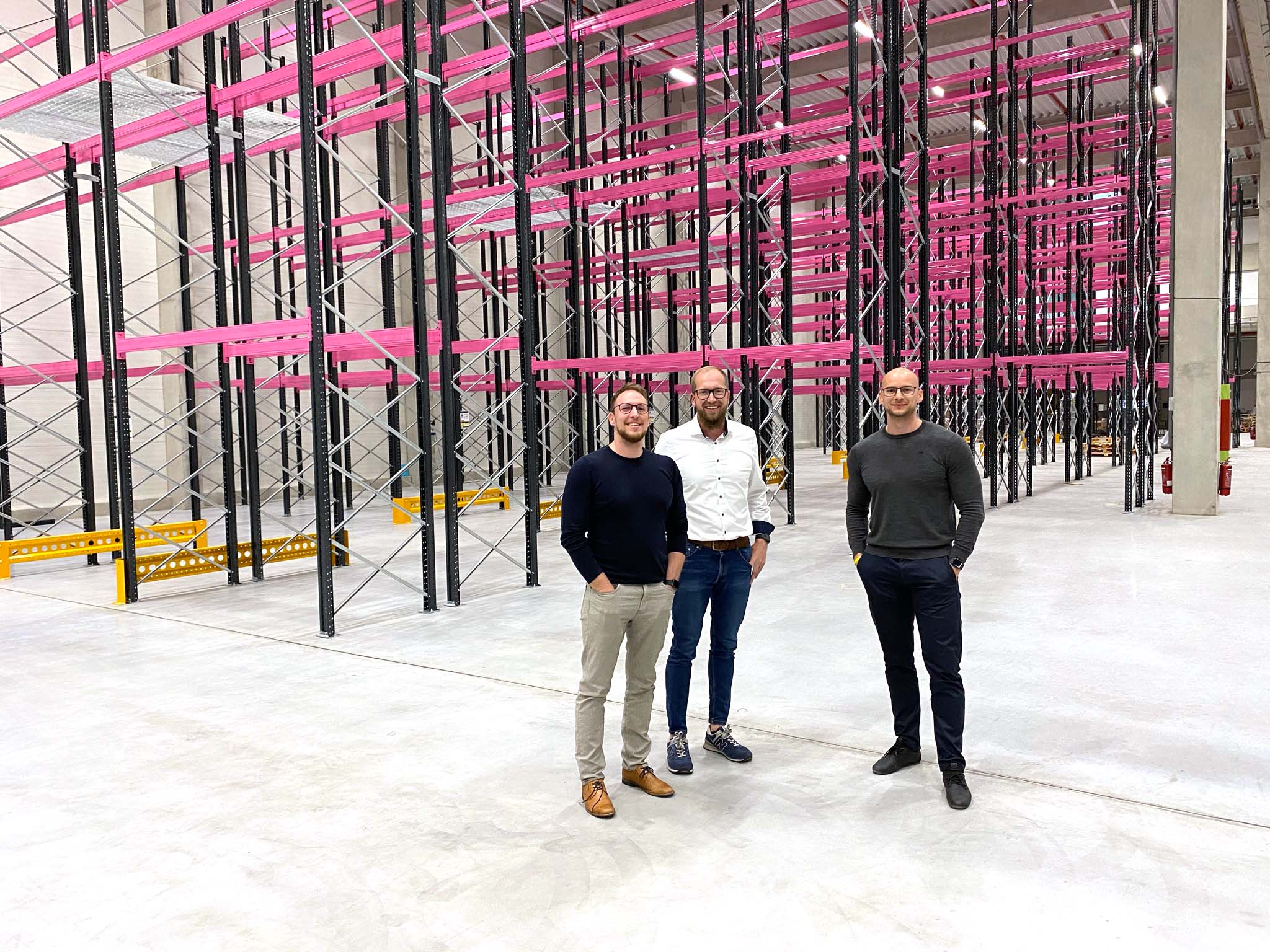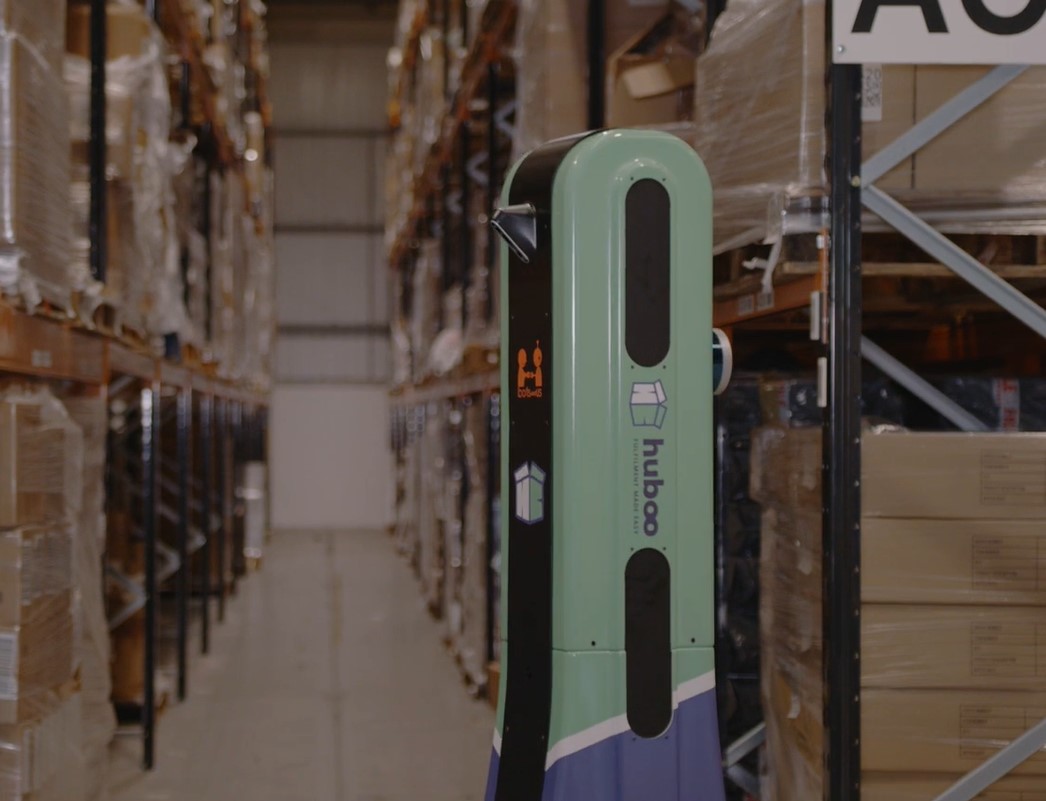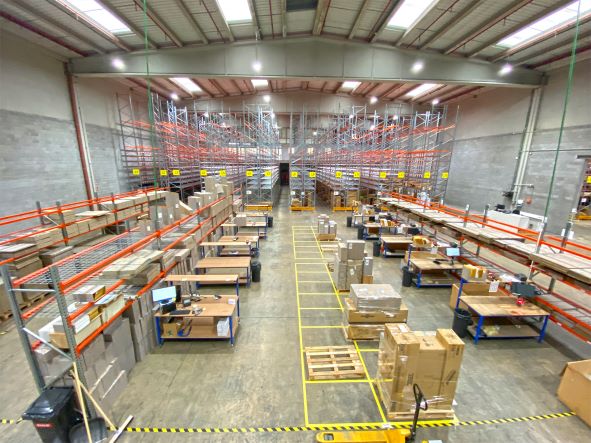Toll Group has implemented Dematic Automated Guided Vehicles (AGVs) at Mars Wrigley’s new national distribution centre in Melbourne, Australia. Toll Group is a leading Australian transportation and logistics (T&L) company, with operations in road, rail, sea, air transportation, and warehousing.
In April 2021, Toll announced it had entered into an agreement with Allegro Funds for the sale of the Global Express business. Completion of the sale is subject to regulatory approvals and other customary closing conditions, with completion targeted for the third quarter of this calendar year.
Toll’s core company mission is to help move the businesses that move the world. With over 130 years of experience, Toll has positioned itself as an industry leader in the T&L sector, equipped with the expertise to solve any logistics, transport, or supply chain challenge.
Locally in Australia, Toll has recently opened the doors to its new, highly automated and purpose-built food DC in Truganina in Melbourne’s west, for its customer Mars Wrigley Australia.
Built by Toll for Mars Wrigley, the DC, which is bigger than two Melbourne Cricket Ground (MCG)s, is now the main Mars Wrigley national supply chain facility. Working alongside Dematic – an intralogistics innovator that designs, builds, and supports intelligent, automated solutions for retail, manufacturing, and distribution operations – Toll has built a facility that sets a new industry standard for automation in Australia.
Shift to automated operations
Following the continuously high demand for Mars Wrigley’s products, Toll and Mars Wrigley strengthened its partnership by investing in a new state-of-the-art facility in Melbourne.
Built to manage all national storage, dispatch and replenishment operations, the dedicated Mars Wrigley facility is highly automated to optimise warehouse operations in a resilient and robust way, so as to accommodate for current and forecast future demand growth.
Peter Stokes, Global Logistics President at Toll, says that the new DC represents the future of supply chain and logistics in Australia, with its advanced integration of automated technology, including AGVs, positioning it as a flagship facility for the industry.
“Early on in the project, there was a lot of effort that went into understanding Mars Wrigley’s business strategy and its products. Equally, because of the capital investment, and the level of complexity around the project, there were many measures undertaken to understand the future view of what Mars Wrigley was aiming to achieve,” said Stokes.
“When designing the facility, we took Mars Wrigley’s strategic needs strongly into account and our partnership with them has been particularly important in doing this. The facility is designed and purpose-built for Mars Wrigley to support its national distribution in Australia – serving as a multi-chamber, multi-temperature facility, now heavily automated with the use of AGVs.”
A large deployment of 17 Dematic AGVs are in operation at the Toll Mars Wrigley DC. With its industrious design, size, and deployed automation, the new facility removes the need for offsite storage, which was not possible under previous supply chain models.
“Mars Wrigley’s definitive direction for this project was to provide a platform for efficiency, safety, and performance for both our customers and the business, and to create an even greater partnership between Toll and Mars Wigley moving forward,” said Chris Georgiou, Supply Chain Director, Mars Wrigley.
“After the unprecedented levels of demand experienced during the pandemic, on top of the already surging demands on the grocery sector in general, it was clear that we needed to make the most out of this new facility, which is why we chose to optimise the facility with the use of automation; with the help of Toll and Dematic. This transition has helped us to not only boost efficiency in the current term but to match our ambitions for future growth,” added Georgiou.
Selecting an Automation Partner
Due to Dematic’s long-term track record of successfully implementing automated technology solutions to warehouse environments, Toll was assured that this investment in AGVs from Dematic would meet the current and future needs of Mars Wrigley.
“The selection of technology partners is really important for us, which is why we selected Dematic for this project. Dematic has long been a leader for automation in the industry, and so, our decision to select them as technology and integration partner was based on their wide-spread expertise in implementing this kind of automation, and their hands-on approach to ensuring the system is deployed correctly and able to achieve its full potential,” said Stokes.
Dematic is the leading supplier of AGVs in Oceania, having supplied over 700 AGVs in upwards of 120 projects across the region. Dematic AGVs are designed, engineered, programmed, and manufactured in Sydney Australia using world-leading component systems.
Streamlining DC Operations
The Dematic AGVs work as driverless forklifts that are integrated with the Toll’s existing WMS to be loaded with data before setting off on daily tasks.
“AGVs are intelligent solutions that operate at a faster rate than any palletisation activity done with a manual forklift, with the end result being to eliminate all manual activity completely. Overall, this has been the core focus when optimising the new Toll Mars Wrigley facility with automation,” said Tony Raggio, General Manager of Sales, AGVs, Dematic.
The 17 AGVs at the Melbourne facility are purpose-built to operate across different areas of the DC.
Thirteen Dematic High-Reach AGVs work to store and retrieve pallets of product in pallet racking; lifting pallet loads up to 10.5 metres high, with extendable tines to operate in double-deep racking. The remaining four units – Dematic Counterbalance AGVs – efficiently take care of pallet transportation tasks in the facility.
The AGV solution manages, transports and stores pallets within the facility, with custom-designed functionalities designed to operate for up to 24 hours with automated battery exchange. They work to receive, transport and store full inbound pallets or raw materials into double deep racking, in line with Toll’s business rules. Similarly, the AGVs work to transport picked pallets for replenishment to selected handover locations, or outbound replenishment and order staging areas.
“The AGVs working at the Melbourne facility are each broken down to operate in the areas that they are built for. For example, outbound orders are picked by the High-Reach AGVs, which are then dropped at the end of the racking aisle to be transported to the staging area by the Counterbalance AGVs. This way, the entire fleet of AGVs work cohesively with each other, offering a completely automated picking, receiving, and transporting cycle within the DC,” added Raggio.
The AGV Manage System (AGVM) communicates directly with Mars Wrigley’s existing WMS, Programmable Logic Controller (PLC), manual forklifts and all AGVs operating within the warehouse.
The AGVs navigate the facility with a laser-guidance system and use onboard hazard detection to avoid collisions. This high-end navigation allows them to move around the facility optimally and safely. To do this, a rotating Laser scanner mounted on top of the AGV is used to measure angles and distances to reflectors mounted on the surrounding walls within the facility. The AGVs then calculate a position based on the information from the laser scanner, together with speed and steer encoders. By using encoder and laser feedback, the AGVs have a repeatable accuracy of +/- 5mm.
Additionally, the AGVs are powered by lithium-ion batteries and can drive themselves onto charging floor plates at times of inactivity to be fully charged in just two hours, as part of the Automated Battery Exchange function.
AGV Rollout
As part of the rollout, Dematic successfully tailored the unique specifications of the AGVs to the facility and Toll and Mars Wrigley’s business strategy.
By providing necessary planning and simulation data at the beginning of the project, such as item, stock, and goods-in and goods-out data, Dematic and its project management team worked alongside Toll to ensure the AGV solution was deployed correctly to achieve its full potential.
Additionally, the AGVs implementation took into account the solution’s requirements and the facility’s existing infrastructure and power supply. This included compatibility with IT networks and connection requirements, power supply for the WMS, server systems, workstations, and peripheral mobile devices.
“Dematic worked alongside our team for every step of the implementation process, assessing all major factors with its rollout and support team to make sure everything was done correctly,” said Stokes. “The hands-on approach taken by Dematic helped us to understand how the AGVs were going to fit into the existing infrastructure of the facility, and how they were going to operate within the space. This gave us the confidence that the solution would exceed the expectations we had for it.”
Safety and Training
Dematic implemented a training program for the use of the AGV systems within the new Toll Mars Wrigley facility. For the training phase, technical and support personnel from Dematic ran practical training sessions for duties such as storage, relocation and item picking, and the system maintenance of all system components.
For maximum safety in an environment where there are personnel and other material handling equipment, the AGVs have three obstruction sensors. These sensors are designed to identify any unexpected object within the scanner’s horizontal sensing plane. The obstruction sensor has two sensor fields – one protection field and one warning field. When an obstacle is detected in the warning field, which is longer and wider than the protection field, the vehicle will slow down to below normal walking pace. When an object is detected in the protection field, the safety relay will trigger an emergency stop within the AGV and it will remain stopped until the obstruction is cleared.
The AGVs also have four emergency-stop buttons, with one in each corner of the AGVs. Once pushed, they trigger an emergency stop in the vehicle until it is released manually, and the reset button is pressed.
Additionally, fire protection measures are also included as part of the AGV solution’s safety protocols, with the system connected to all sprinkler systems, central fire alarms and smoke and heat vents within the facility.
Service and Support
Dematic’s full ongoing service and support program help Toll to optimise system uptime, continuity of throughput, and production efficiency. This will ensure Toll and Mars Wrigley are getting the best ROI on the AGV investment.
Additional service and support provided by Dematic includes a maintenance, refresher operator, and general system function employee training day course every six months, to increase employee confidence and knowledge of the AGVs.
“Our service and support program provides resources that ensure the best level of productivity is achieved. By working to reduce system downtime due to component failures, we can, in turn, reduce the overhead costs of system maintenance for Toll and ensure that the solution is able to operate in the best way possible,” said Raggio.
Benefits of AGV Solution
For Toll and Mars Wrigley, being able to partner on an investment in a new state-of-the-art DC that features advanced automation technology like AGVs and is optimised to meet high growth now and into the future, has been the biggest benefit overall.
The optimisation of warehouse operations using AGVs has enabled Toll Mars Wrigley to utilise its new facility to achieve significant improvements to the efficiency, accuracy, productivity, and safety of picking, put away transportation, and retrieval and replenishment operations.
The deployment of AGVs has provided Toll Mars Wrigley with the ability to achieve an increased capacity of holding goods within the warehouse; capable of storing an additional 31,000 pallets of goods – equivalent to 730 million MARS bars. This means the AGVs will allow Mars Wrigley to accommodate for future growth, of up to 50,000 total pallets, compared to its current use of 19,000 pallets. This will greatly support Mars Wrigley’s growth ambitions in the Australian market.
“The new facility is a core pillar of our business strategy, which is based around improving the safety, quality, service, and cost metrics of our operations. Since implementing the AGVs at the new DC, we have already seen a significant boost in productivity by switching from manual to automated operations. Likewise, the introduction of smart technology and automation will support our ambition to grow as a business,” said Georgiou.
With such a high level of autonomy, AGVs provide the backbone for a 24/7 operation to maximise service levels, which would otherwise be very costly to maintain. AGV systems can naturally grow with the addition of vehicles as volumes increase, and being exchangeable, they provide an unmatched level of system redundancy. As the human error factor is taken out of the equation, AGVs also eliminate costly product and equipment damage.
The robust design of the AGVs also means they can withstand the typically challenging environment of a warehouse, all whilst providing a 360° safety field of protection. This enables the AGVs to effectively and safely co-work with operators and any other warehouse machinery or vehicles.
“With the safety of DC workers being our top priority, this use of automation with the AGVs creates a safer workplace and minimises mistakes that can lead to damaged products. This provides a better outcome for Mars Wrigley’s safety standards, whilst also ensuring its products arrive on supermarket shelves on time and in peak condition,” concluded Stokes.











